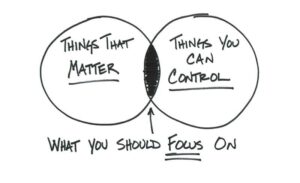“Time is a sort of river of passing events, and strong is the current; no sooner is a thing brought to sight than it is swept away, and another takes its place, and this too will be swept away.” `Marcus Aurelius
Priorities
Time Management starts and ends with establishing priorities based on goals and is driven by values. Marcus Aurelias’ quote is on my wall to remind me that each moment is a gift and the choices I make are of my own free will. If I am careless with my time when it is gone, it’s gone forever. I maintain a running list of priorities for when the current of the river quickens and I need to make decisions to keep myself on course. These are my priorities in order.
- Stability and personal well-being.
- Family.
- Work.
- Volunteerism.
- Personal Growth & Professional Development.
- Friendship.
48-Hour Time Tracking
For the first of these two days, I was traveling for work. Travel is a normal activity for me so evaluating time management on travel was important. Although, when I am home, I don’t watch TV, play video games, or spend much time on social media. This table summarizes my findings during the time-tracking activity.
|
18 May |
19 May |
|
|
Priority 1: Stability |
10.5hr (6.5hrs of sleep) |
8.0hr (6.25hrs of sleep) |
|
Priority 2: Family |
2.2hr |
6.4hr |
|
Priority 3: Work |
9.0hr |
5.25hr |
|
Priority 4: Volunteering |
No measurable time |
2.0hr |
|
Priority 5: Growth |
1.2hr |
1.25hr |
|
Priority 6: Relationships |
0.6hr |
0.6hr |
|
“Wasted Time” |
0.5hr |
0.5hr |
Action Plan and Time Management Strategies
What follows are five practices I use to stay on top of my personal time management. These work for me but may not apply to everyone.
Stay to the left.

On a timeline, the area to the left refers to the time before an event. I am intentional about knowing where I am on my timeline and never letting anticipated events surprise me. Year by year, month by month, and day by day I work to stay ahead of big tasks and prepare for conflicts well in advance of turbulence. I am no stranger to a demanding operational tempo. My day job and volunteer work require me to travel up to 150 days per year and participate in several key events and a steady drumbeat of meetings each week. For me to stay ahead and keep things balanced I keep a close eye on the horizon. At the end of each week, I review the next 6 weeks to stay ready. I am a fan of Parkinson’s Law (Ferriss, 2009) which says, a task will expand to fill the time available. I apply this principle in all major tasks by first assigning a due date then I get as much done as I can as early as possible. As the due date approaches, I revisit the task and refine it progressively to “stay to the left” while continuously improving the end result.
Know what is within my control and control the controllable.

In the book, “Man’s Search for Meaning”, Viktor Frankl encourages us to control the controllables (Frankl, 1962). Steven Covey takes this a step further with his explanation of the circle of concern and the circle of influence (Covey, 1989). To manage my time, I have accepted three rules. First, I take inventory of what my concerns are. I routinely doodle on paper plates to inventory my concerns to answer the question, “What’s on my plate right now?”, and whether I can do anything about them or not. Second, I use a proactive (Covey, 1989), growth-mindset (Dweck, 2016) to manage the things that are within my control. When a concern comes to my attention, I ask myself, what is the best first right step I can take to address this? Lastly, I let go of the things that cannot be managed and accept them for what they are; beyond my control.
Limit distractions.

While I am confident in my time management skills, I realized while doing the reading for this assignment the impact the alerts on my phone were having on my productivity. In February after watching, “The Social Dilemma” (Exposure Labs, 2020), I removed all social media from my phone except LinkedIn. I immediately noticed a return on objective (ROO). According to my phone’s analytics, my screen time is down by nearly 50%. However, for fear of missing out (FOMO), I decided to leave my email alerts on. Effective today, those have been turned off and I look forward to not being distracted by random alerts. Using the Eisenhower Matrix (Mount, 2016), most of the interrupting emails fall into quadrant 4, not urgent and not important. By turning off these alerts I can focus and eventually, archive, or action these emails.
Fiercely protect priorities 1 and 2.

Many years ago I attended a particular change of command between outgoing and incoming Battalion Commanders where I caught some powerful advice in one the many speeches. As the incoming commander addressed the battalion, he rattled off a list of maxims that would inform his leadership decisions. The one that resonated with me was, “the funeral front row.” He proclaimed that he intended to live to a very old age and that at his funeral, sitting in the front row would be his family. Chances are the rest of us would not be there. He was a great battalion commander, but I can’t tell you if he is alive today. I’m sure his family can. He admitted to us that if he ever had to decide between work or family, his family would come first, and he encouraged us to do the same. At that point in my life, I wasn’t living up to that maxim, and have even struggled with it occasionally in the years since. However, today my well-being and my love for my family will always be my priority. It is because of this commitment that I can balance as much as I do.
W.I.N. at all costs.
 W.I.N. – What’s Important Now? For the better part of four decades, I have enjoyed life far beyond the edge of my comfort zone. At the age of 18, I was an ocean lifeguard and after two years of summer feast and winter famine, I joined the Army as a Military Policeman where I spent 21 years on the edge of my seat with white knuckles on the wheel looking for the next big adventure. While I enjoy much lower physical risks these days I am still in constant hot pursuit of the next challenge. I maneuver through turbulent and challenging times from one big adventure to the next with W.I.N. as my watchword. This phrase was initially coined by Football Coach, Lou Holtz to motivate his teams to constantly be ready to pivot based on a constantly evolving game (Holtz, 1998). My six priorities were established long ago as were the goals and values that support them. For me, when I am moving from one task to the next, looking at the horizon, ready for what’s to come, I ask myself, “What’s important now?” and the appropriate priority or long-term goal becomes evident and informs my decisions and actions.
W.I.N. – What’s Important Now? For the better part of four decades, I have enjoyed life far beyond the edge of my comfort zone. At the age of 18, I was an ocean lifeguard and after two years of summer feast and winter famine, I joined the Army as a Military Policeman where I spent 21 years on the edge of my seat with white knuckles on the wheel looking for the next big adventure. While I enjoy much lower physical risks these days I am still in constant hot pursuit of the next challenge. I maneuver through turbulent and challenging times from one big adventure to the next with W.I.N. as my watchword. This phrase was initially coined by Football Coach, Lou Holtz to motivate his teams to constantly be ready to pivot based on a constantly evolving game (Holtz, 1998). My six priorities were established long ago as were the goals and values that support them. For me, when I am moving from one task to the next, looking at the horizon, ready for what’s to come, I ask myself, “What’s important now?” and the appropriate priority or long-term goal becomes evident and informs my decisions and actions.
For me, time management starts and ends with my priorities based on my goals and driven by my values. As Laura Vanderkam says in her 2016 TED Talk (Vanderkam, 2016),
“When we focus on what matters we can build the lives we want, with the time we’ve got.”
Works Cited
Covey, S. R. (1989). The Seven Habits of Highly Effective People: Restoring the Character Ethic. New York: Simon and Schuster.
Dweck, C. S. (2016). Mindset: The New Psychology of Success. New York: Ballantine Books.
Exposure Labs (Producer), & Orlowski, J. (Director). (2020). The Social Dilemma. Netflix, netflix.com/title/81254224.
Ferriss, T. (2009). The 4-Hour Work Week. New York: Crown Publishers.
Frankl, V. E. (1962). Man’s Search for Meaning: An Introduction to Logotherapy. Boston: Beacon Press.
Holtz, L. (1998). Winning Every Day: The Game Plan for Success. New York: Harper Collins.
Mount, K. (Practitioner). (2016). The urgent/important matrix [Video file]. SAGE Video.
Vanderkam, L. (2016, October). Laura Vanderkam: How to gain control of your life [Video file]. TEDTalks.


